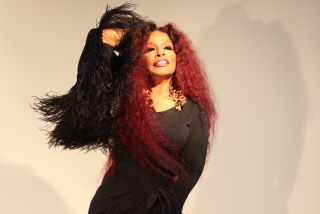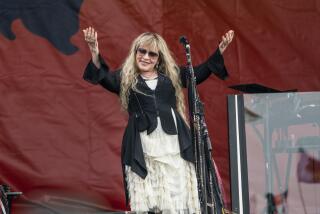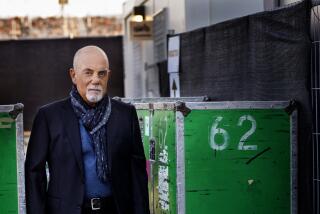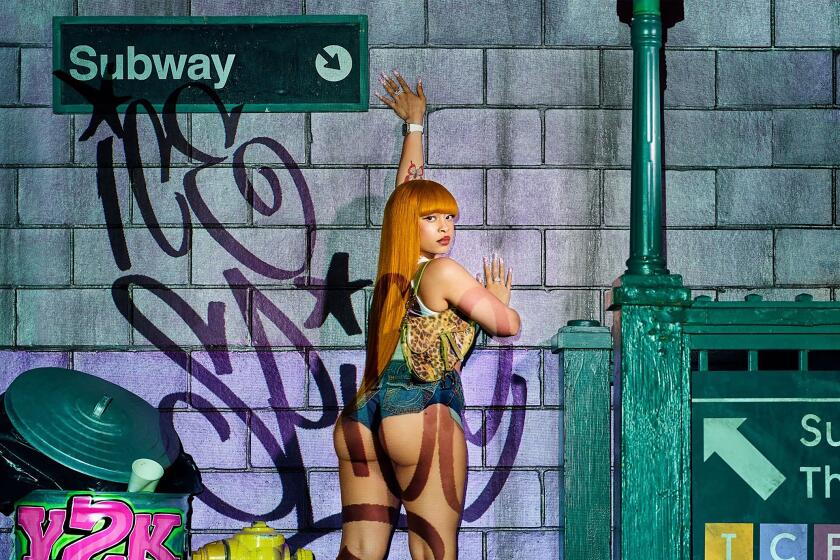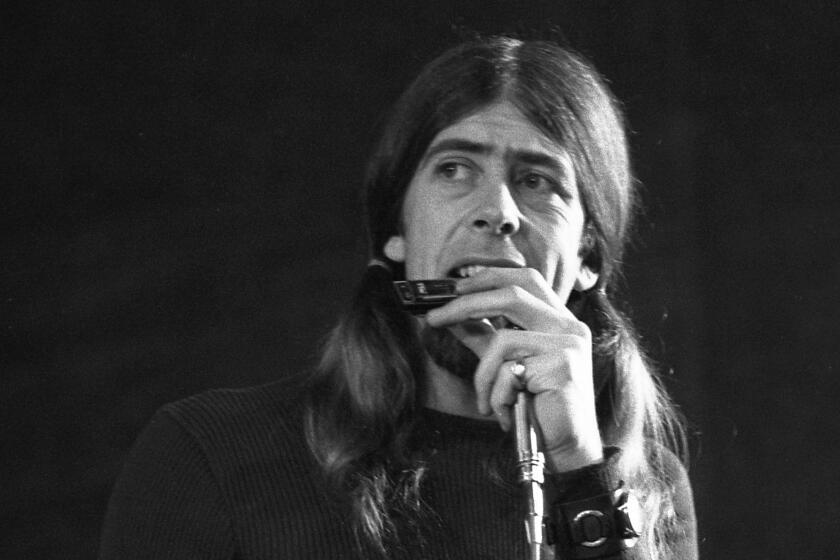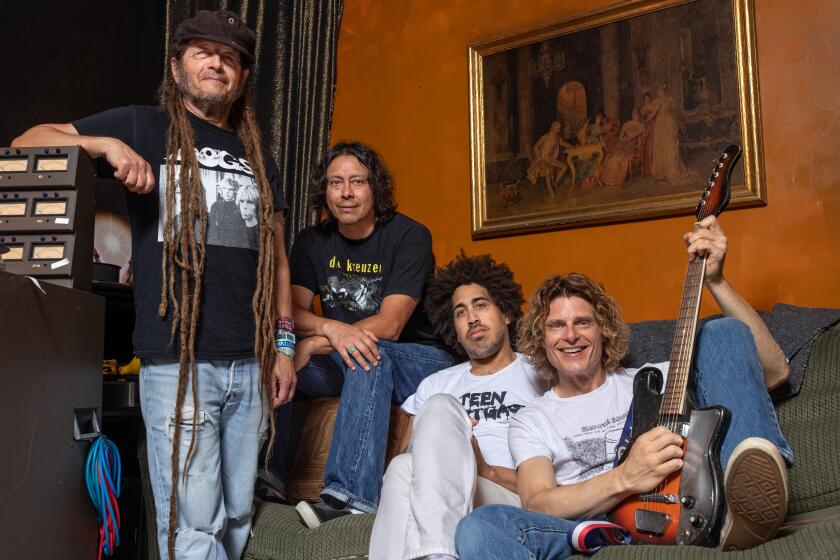He’s Still Hooked on Jazz
During the 1950s, early jazz wasn’t exactly the rage in Marine, Minn., the town of 300 where Butch Thompson grew up.
But Thompson’s Dad was a mild jazz buff, and that was enough to hook the youngster. At 47, Thompson remains devoted to the music of Fats Waller, Jelly Roll Morton, Scott Joplin and others, which he delivers on both piano and clarinet.
And tonight at 8:30, Thompson’s trio--also including drummer Hal Smith and bassist Robbie Schlosser--plays Copley Symphony Hall, presented by the San Diego Community Concert Assn.
Though traditional jazz is Thompson’s first love, and he has recorded albums of his own since the early 1960s, he is best known as the regular pianist on writer-raconteur Garrison Keillor’s “A Prairie Home Companion” public radio show from 1974 to 1987.
Thompson and Keillor met at the University of Minnesota during the early 1960s, where Keillor edited the campus literary review and had a show on the college radio station--he even spun one of Thompson’s first albums (on clarinet with a band called the Hall Brothers).
After two years in the service, Thompson returned to Minnesota in 1968 to complete his education and renewed his casual association with Keillor. And shortly after “A Prairie
Home Companion” was nationally syndicated in the early 1970s, Thompson became the regular pianist.
All the while, he kept his own music career going. To date, he estimates he has recorded roughly 100 albums, including 20 or so as a leader. Many of these are jazz, but some are other forms of music, including the folksy stuff sometimes heard on Keillor’s radio program.
Thompson, who lives in St. Paul, Minn., with his second wife, fondly remembers a childhood drenched in jazz. He started playing piano at 6, and took up the clarinet as a member of various school bands.
“My interest in jazz started before I was even a teen-ager,” he said. “I heard records, some of them owned by my Dad. He wasn’t a serious jazz collector, but he had been a teen-ager during the 1930s, so he had Goodman, Ellington, Basie.
“He was buying 45s, and we were playing them on his 45 r.p.m. changer that sat on top of the television set. All the old 78s were being re-issued on 45s, and I started buying records. Then boogie-woogie piano caught my ear. There wasn’t much available in Marine, Minn., but you could find it if you looked around.
“I got some things by Albert Ammons and I tried to play some of his stuff at 12 or 13, then I got some boogie-woogie instruction books. I heard Louis Armstrong, without knowing much about him, and I loved him. I remember seeing him on TV during the 1950s--Tommy and Jimmy Dorsey had a variety show, and the whole family used to watch.
“Then my Dad took me to hear Armstrong at 15, and that knocked me out. When I was 16, I heard Earl (Fatha) Hines in St. Paul, and that really killed me, it was a real eye opener. Most of these guys I liked were black musicians, but I had an interest in just about any kind of jazz, even the modern stuff Dave Brubeck was doing.”
Thompson’s two-hour concert features music by Morton and other famous jazz forefathers.
“We usually open with Scott Joplin’s ‘Maple Leaf Rag,’ (written in 1899), which is old but still popular,” he said. “People recognize it, just like they do many of the other standards we play.
“We also do ‘The Charleston,’ the dance number that James P. Johnson wrote in the ‘20s. We do Fats Waller’s ‘Ain’t Misbehavin’ and ‘Honeysuckle Rose,’ Eubie Blake’s ‘Charleston Rag,’ and we put in Jelly Roll Morton’s ‘King Porter Stomp,’ written around the turn of the century but popular during the 1930s.”
Thompson released three new CDs last year, all named after songs by Morton, the legendary Louisiana-born pioneer of the jazz piano: “New Orleans Joys,” “Chicago Breakdown” and “Good Old New York.”
Such jazz heirlooms don’t include the extended, sometimes obtuse improvisations of their modern be-bop successors, but there is room for improvisation.
“It’s a different kind of improvisation--thematic,” Thompson explained. “Only a few notes here and there, but it is an improvisational music. As an example, if you take some of the things we play by Jelly Roll Morton, you can’t really play the stuff right unless you vary it and improvise--there are big spaces that need to be filled up.”
Interest in Thompson’s authentic brand of jazz runs high, both in the United States and abroad.
“During the past five years, I’ve probably spent 50% of my time on the road,” he said. “We do community concerts like this one, college appearances, jazz festivals (he’ll be back in San Diego next month for the San Diego Thanksgiving Dixieland Jazz Festival in Mission Valley). And I do a spring tour of Europe each year.”
After nearly 30 years immersed in the jazz of the distant past, Thompson said he has no desire to play anything fashionable, contemporary or cutting-edge.
“The cutting edge person is a rarity,” he said. “There’s only one genius in about 50,000 people. I don’t have to justify what I do. I just like doing it. I like the direct appeal, the fact that the music is based on a strong beat, that there are recognizable things people can relate to.
“What gets me sometimes is talking to musicians who feel that I’m behind the times, when in fact the music they are playing was generated in the 1940s. If you’re a be-bop player, your music is 50 years old, let’s face it.”
More to Read
The biggest entertainment stories
Get our big stories about Hollywood, film, television, music, arts, culture and more right in your inbox as soon as they publish.
You may occasionally receive promotional content from the Los Angeles Times.
